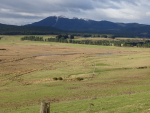[ad_1]

Pāmu is celebrating a major milestone in its on-farm biodiversity safety and restoration programme, with over 10,000 hectares of essential native habitat now protected in perpetuity with QEII covenants.
QEII covenants (also referred to as open house covenants) present everlasting authorized safety for areas of serious pure, cultural and panorama worth.
Pāmu has reached the ten,000-hectare milestone, with the registration of 5 blocks on Dale Farm within the Te Anau Basin. Dale Farm is a 2,549ha sheep and beef farm within the Upukerora Ecological District.
Pāmu chief govt Mark Leslie says the co-operative goals to be a frontrunner in built-in sustainable land use defending and restoring the pure world.
He says QEII covenants are a tangible manner Pāmu can guarantee stewardship of pure belongings and the safety of lands and waterways for New Zealand.
“Over 10,000 hectares of QEII covenants is a milestone to rejoice,” he says. “We even have one other 6,000 hectares below covenants with the Division of Conservation and different our bodies.”
“This strategy together with forests on steep hill nation and waterway fencing and riparian planting all add up – enabling us to nurture and enrich the land on which we farm. It’s about balancing our efficiency and the atmosphere for the good thing about generations to come back,” says Leslie.
Native vegetation cowl within the Upukora district right now is way decreased, on account of previous burning and clearance of huge areas of forest, shrubland and tussock land.
The QEII covenants on Dale Farm and different surrounding Pāmu farms are vital as they shield a number of the few remaining areas of major and secondary forest, wetlands, and transitional zones nonetheless current within the district.
The Dale Farm covenants shield the habitats of a number of acutely and chronically threatened indigenous species, together with the Nationally Endangered Central Otago roundhead galaxias and At Threat – Declining species similar to South Island robin, slender wine sedge, matagouri, and manuka.
Pāmu has a longstanding partnership with the QEII Nationwide Belief that has seen a complete of 236 covenants put in place on 58 farms, defending 10,126 hectares in whole.
QEII Belief consultant Mark Sutton has labored carefully with Pāmu for over twenty years and says the robust relationship between QEII reps, Pāmu farm managers and Pāmu workers in Wellington has been key to the success.
“Pāmu recognised the necessity to shield areas of biodiversity on their properties, and placing strong authorized safety over these areas underscores their dedication to guard and take care of them in perpetuity,” says Sutton. “Their strategy, defending whole sub-catchment methods for future water high quality and biodiversity connectedness, is a significant achievement.”
“The working relationships developed in my time with Pāmu environmental managers, the late Gerry Soanes and now Gordon Williams, and the farm managers themselves, have been key in securing the 236 covenants thus far,” he says.
Pāmu atmosphere supervisor Gordon Williams says having a biodiversity technique has assisted the method.
“The technique has three key pillars: establish all biodiversity worthy of safety; shield it; and improve it. That has been, and can proceed to be, my mantra,” says Williams.
“Each our farm groups and QEII Belief reps are passionate supporters of the method and take a lot pleasure in defending these areas, for the good thing about future generations. The job isn’t executed but, though I do have a lot of the previous few areas for consideration in my sights,” he says.
Every of the Pāmu covenants on Dale Farm, very like the remainder of the nation, are fenced to a stock-proof customary, giving the areas help to enhance to a extra consultant state. Fencing within the Te Anau Basin is commonly collectively funded by Pāmu, the Waiau Belief, and QEII.
[ad_2]
Source link

